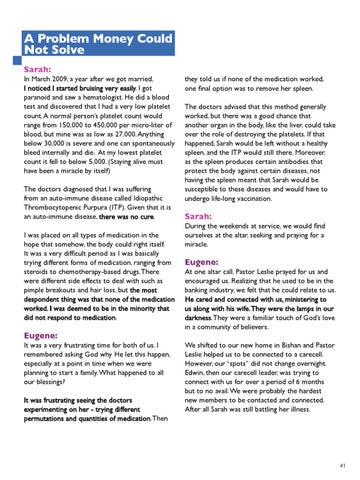A Problem Money Could Not Solve Sarah: In March 2009, a year after we got married, I noticed I started bruising very easily. I got paranoid and saw a hematologist. He did a blood test and discovered that I had a very low platelet count. A normal person’s platelet count would range from 150,000 to 450,000 per micro-liter of blood, but mine was as low as 27,000. Anything below 30,000 is severe and one can spontaneously bleed internally and die. At my lowest platelet count it fell to below 5,000. (Staying alive must have been a miracle by itself) The doctors diagnosed that I was suffering from an auto-immune disease called Idiopathic Thrombocytopenic Purpura (ITP). Given that it is an auto-immune disease, there was no cure. I was placed on all types of medication in the hope that somehow, the body could right itself. It was a very difficult period as I was basically trying different forms of medication, ranging from steroids to chemotherapy-based drugs. There were different side effects to deal with such as pimple breakouts and hair loss, but the most despondent thing was that none of the medication worked. I was deemed to be in the minority that did not respond to medication.
Eugene: It was a very frustrating time for both of us. I remembered asking God why He let this happen, especially at a point in time when we were planning to start a family. What happened to all our blessings? It was frustrating seeing the doctors experimenting on her - trying different permutations and quantities of medication. Then
they told us if none of the medication worked, one final option was to remove her spleen. The doctors advised that this method generally worked, but there was a good chance that another organ in the body, like the liver, could take over the role of destroying the platelets. If that happened, Sarah would be left without a healthy spleen, and the ITP would still there. Moreover, as the spleen produces certain antibodies that protect the body against certain diseases, not having the spleen meant that Sarah would be susceptible to these diseases and would have to undergo life-long vaccination.
Sarah: During the weekends at service, we would find ourselves at the altar, seeking and praying for a miracle.
Eugene: At one altar call, Pastor Leslie prayed for us and encouraged us. Realizing that he used to be in the banking industry, we felt that he could relate to us. He cared and connected with us, ministering to us along with his wife. They were the lamps in our darkness. They were a familiar touch of God’s love in a community of believers. We shifted to our new home in Bishan and Pastor Leslie helped us to be connected to a carecell. However, our “spots” did not change overnight. Edwin, then our carecell leader, was trying to connect with us for over a period of 6 months but to no avail. We were probably the hardest new members to be contacted and connected. After all Sarah was still battling her illness.
41
